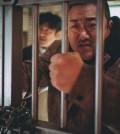- California Assembly OKs highest minimum wage in nation
- S. Korea unveils first graphic cigarette warnings
- US joins with South Korea, Japan in bid to deter North Korea
- LPGA golfer Chun In-gee finally back in action
- S. Korea won’t be top seed in final World Cup qualification round
- US men’s soccer misses 2nd straight Olympics
- US back on track in qualifying with 4-0 win over Guatemala
- High-intensity workout injuries spawn cottage industry
- CDC expands range of Zika mosquitoes into parts of Northeast
- Who knew? ‘The Walking Dead’ is helping families connect
Seoul aims to host AIIB, AfDB conferences

Finance Minister Yoo Il-ho (2nd from L) speaks at an overseas economic policy meeting in Seoul on May 12, 2016.
SEOUL, (Yonhap) — Finance Minister Yoo Il-ho said Thursday that South Korea will try to host annual meetings of the Asian Infrastructure Investment Bank (AIIB) in 2017 and the African Development Bank (AfDB) in 2018.
“The hosting of such international events will contribute to improving our status on the global stage and help our companies advance to the regions,” said the minister in an overseas economic policy meeting in Seoul.
Initiated by China, the AIIB was formally launched earlier this year, with 57 founding members including South Korea, in a bid to promote economic growth in the Asian region by supporting infrastructure investment. South Korea has a 3.81 percent stake, the fifth largest among member countries.
The country is also moving aggressively to strengthen economic ties with the African continent.
Yoo also said that Asia’s fourth-largest economy has been showing weak recovery momentum due to sluggish exports and investment amid a protracted slowdown in the global economy.
“As the world economy has entered a low-growth cycle, coupled with low oil prices and financial volatility, we face heightening external uncertainties,” the minister said. “South Korea’s export, investment and other private sectors are losing vitality, failing to give firm recovery momentum to the economy.”
South Korea’s exports, the country’s key economic driver, sank 11.2 percent in April, extending their losing streak to 16 straight months.
Industrial output, closely linked to outbound shipments, fell 1.5 percent in March due to the sluggish semiconductor sector, while the manufacturing capacity utilization rate stayed low at 73.2 percent.
Facility investment marked a 7.8 percent fall in March, nearly unchanged from a 7.7 percent fall in the previous month.
For the first quarter of this year, gross domestic product (GDP) grew 0.4 percent from three months earlier, down from a 0.7 percent on-quarter expansion for the fourth quarter of last year.
The finance minister said a groundbreaking change is needed to make a turnaround in exports, which account for more than 50 percent of the country’s GDP.
“It is important for us to seek a new breakthrough to revive the vitality of exports,” said Yoo, who also doubles as deputy prime minister for economic affairs.
He said the newly-opened Iranian market can be one of the best business options for South Korean exporters, citing President Park Geun-hye’s landmark visit to Iran that led to the signing of a number of memorandums of understanding on joint economic projects valued at US$37.1 billion.
“We have to find ways to realize these opportunities into business outcomes and contribute to providing fresh momentum to the economy,” he added.
He stressed that the government will come up with timely measures to deal with the downside economic cycle and take decisive action to lead sweeping structural reform in the corporate and industrial sectors.
Meanwhile, the BOK slashed its growth outlook for 2016 to 2.8 percent from a 3.0 percent forecast and the International Monetary Fund downgraded its estimate to 2.7 percent, citing waning global demand and low oil prices.
However, the finance ministry remained unchanged at 3.1 percent growth estimate, saying that private consumption is brisk enough to prop up the economy, but analysts predict that it may cut the growth estimate next month.








![trump[reuters]](http://www.koreatimesus.com/wp-content/uploads/2024/05/2023-06-10T235115Z_520439966_RC2NG1AXVQJW_RTRMADP_3_USA-TRUMP-copy-120x134.jpg)


